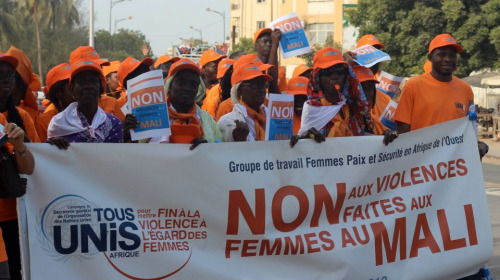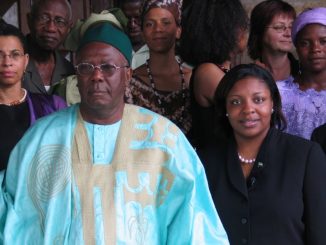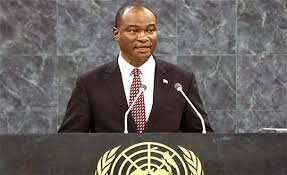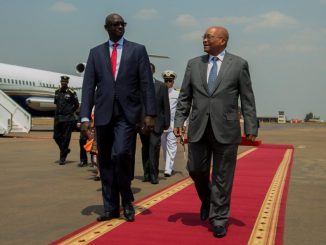
31 October 2000, the Security Council adopted a landmark resolution on women’s participation in peace processes. Last year, the United Nations took stock of how successfully, or not, the historic text – resolution 1325 (2000) – has been implemented so far. We talked to Elizabeth Spehar, Director of DPA’s Policy and Mediation Division, to see how DPA is advancing the gender agenda more than 15 years after the adoption of “1325”.

Elizabeth Spehar, Director of DPA’s Policy and Mediation Division. UN Photo
Politically Speaking: What’s the state of play at DPA in relation to 1325?
Elizabeth Spehar: DPA is working hard to incorporate a gender-sensitive and women, peace and security perspective systematically into its prevention, peacemaking and peace consolidation work. The commitment of our Department to this agenda is evident at all levels, starting at the top with Under-Secretary-General Jeffrey Feltman.
And this is not just rhetoric: DPA took on 15 concrete commitments in 2010, which we closely monitor and report on annually to the Security Council. For example, women’s participation in peace processes, both as delegates within negotiating parties and in UN mediation support teams, has increased significantly. When looking at DPA-facilitated mediation processes of the past several years, in terms of their engagement and consultations with civil society organisations, including women’s groups, as well as the number of peace agreements with gender-relevant provisions, we see a similar positive upward trend. The latter is, of course, of great importance for women during the post-conflict implementation and peace consolidation phase. Moreover, gender is also systematically factored into all DPA electoral assistance activities and policies, including through its provision of technical advice to Member States on electoral systems design and reform, as well as through capacity building and training support.

Under-Secretary-General Feltman welcoming participants to the DPA Gender/Women, Peace and Security staff training, hosted by Permanent Representative of the Netherlands Mr. Van Oosterom. Photo: UNDPA
To this end, DPA has, with financial support from Member States and partner organisations, engaged senior mediation officials in a series of UN High-Level Seminars on Gender and Inclusive Mediation Processes. These Seminars offer participants a platform for exchanging experiences and they provide practical tools and strategies for how to design inclusive mediation processes and address the key thematic areas of peace agreements with a gender lens. In our separate gender, women, peace and security staff training, political affairs officers learn more about our commitments and the gendered aspects of DPA’s prevention, peacemaking and peace consolidation work. Over the past four years we have trained 164 senior mediation officials and over 200 political affairs officers from headquarters and our field missions.
What do you mean by “the gendered aspects” of prevention, peacemaking and peace consolidation work?
Although these two terms often get mixed up, gender does not equal women. Gender refers to the socially constructed, in other words not biological, differences between men and women. In DPA, we primarily analyse the different roles and the different impact that conflict has on men and women. Those are the gendered aspects of our work.
Why is this important for political affairs officers?
First of all, in the peace and security-related work that we do, we need to remember that there is a normative responsibility at issue: namely, that women’s participation is a fundamental human right and therefore women need to be fully engaged in the decision-making processes shaping their future. Secondly, there is also a pragmatic, operational reason for this. We work from the premise that women living in conflict are important actors with strategic knowledge and networks that can contribute directly to arriving at peaceful solutions and building peace. Recent academic research, which was highlighted, for example, in the Global Study on 1325commissioned by the Security Council, illustrates how inclusive peacemaking processes, in which women effectively and substantively participate, have a much higher chance of reaching an agreement and sustaining peace long-term. The role of women is also critical for early warning of potential crises and in prevention of conflict and reconciliation in their societies. There are many examples of this. The Global Study was essentially a stock-taking and forward looking exercise on the implementation of Security Council resolution 1325 in the run up to its 15th anniversary in October last year. It is a testimony of the centrality of the women, peace and security agenda for our prevention, peacemaking and peace consolidation work.
How can you further improve DPA’s work on women, peace and security?

On 10 November 2015, Participants at a conference on the Libyan Women Action Plan for Peace presented their unified vision to the international community at the UN in Geneva. Photo: UNSMIL
Well, there is always room for improvement! The Global Study was part of the bigger wave of 2015 UN review processes in the peace and security field which also included the High-Level Independent Panel on Peace Operations (HIPPO) and the Advisory Group of Experts for the 2015 Review of the UN Peacebuilding Architecture (AGE) reports. The recommendations of the three reviews all point to the need to devote more of our efforts to prevention and mediation – bringing them back to the fore – and acknowledging that women play a critical role in these efforts. The October 2015 Secretary-General’s report on Women, Peace and Security outlines the recommendations that will guide the UN system in carrying this forward. DPA has set three new priorities for the next five years to achieve this: First of all, to enhance the integration of the women, peace and security agenda into our inclusive conflict prevention work; and secondly, to increase the participation of women in the monitoring and implementation arrangements of ceasefire and peace agreements that have resulted from our mediation efforts. Lastly, but not least, we want to expand and deepen our partnerships with relevant UN entities to link mediation tracks and more effectively engage with civil society, such as the ongoing DPA – UN Women Joint Strategy on Gender and Mediation. In order for us to effectively carry these cross-cutting priorities forward in all of our work, Under-Secretary-General Jeffrey Feltman has decided to pursue a strengthening of DPA’s small Gender Unit. It is another example of the commitment to investing in the gender and women, peace and security agenda to reach a better peace.
Title Photo: UNOWA



